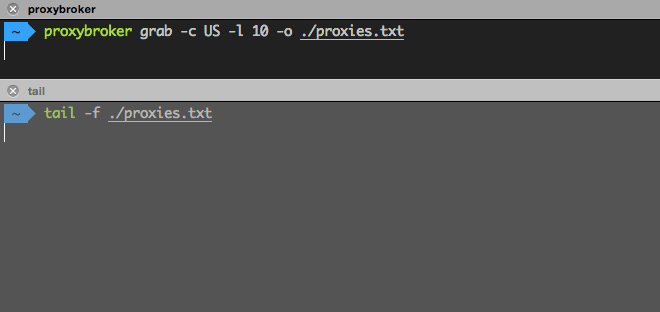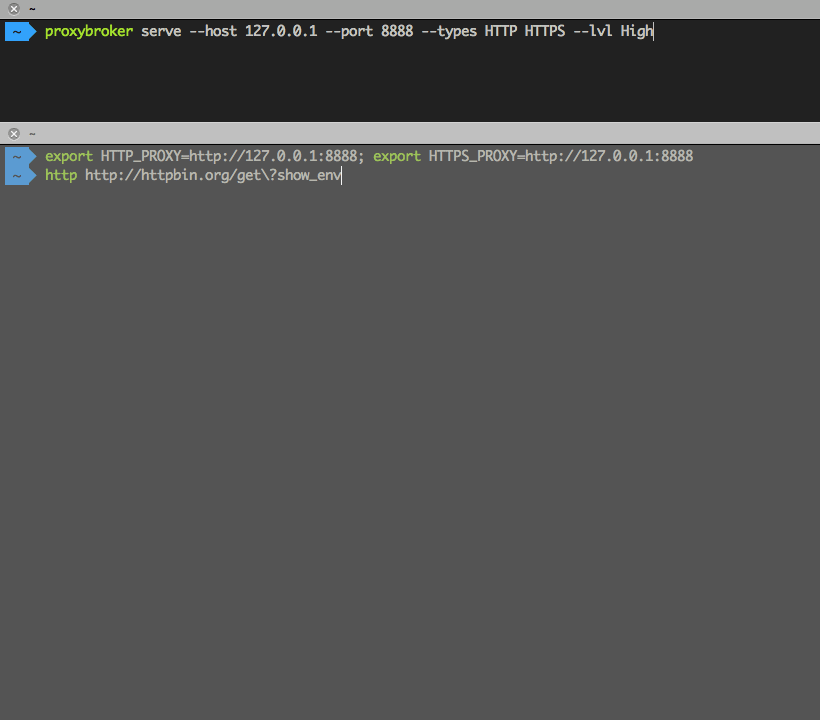
Research
PyPI Package Disguised as Instagram Growth Tool Harvests User Credentials
A deceptive PyPI package posing as an Instagram growth tool collects user credentials and sends them to third-party bot services.
ProxyBroker
===========
ProxyBroker is an open source tool that asynchronously finds public proxies from multiple sources and concurrently checks them.

Docker Hub https://hub.docker.com/r/bluet/proxybroker2
$ docker run --rm bluet/proxybroker2 --help
usage: proxybroker [--max-conn MAX_CONN] [--max-tries MAX_TRIES]
[--timeout SECONDS] [--judge JUDGES] [--provider PROVIDERS]
[--verify-ssl]
[--log [{NOTSET,DEBUG,INFO,WARNING,ERROR,CRITICAL}]]
[--min-queue MINIMUM_PROXIES_IN_QUEUE]
[--version] [--help]
{find,grab,serve,update-geo} ...
Proxy [Finder | Checker | Server]
Commands:
These are common commands used in various situations
{find,grab,serve,update-geo}
find Find and check proxies
grab Find proxies without a check
serve Run a local proxy server
update-geo Download and use a detailed GeoIP database
Options:
--max-conn MAX_CONN The maximum number of concurrent checks of proxies
--max-tries MAX_TRIES
The maximum number of attempts to check a proxy
--timeout SECONDS, -t SECONDS
Timeout of a request in seconds. The default value is
8 seconds
--judge JUDGES Urls of pages that show HTTP headers and IP address
--provider PROVIDERS Urls of pages where to find proxies
--verify-ssl, -ssl Flag indicating whether to check the SSL certificates
--min-queue MINIMUM_PROXIES_IN_QUEUE The minimum number of proxies in the queue for checking connectivity
--log [{NOTSET,DEBUG,INFO,WARNING,ERROR,CRITICAL}]
Logging level
--version, -v Show program's version number and exit
--help, -h Show this help message and exit
Run 'proxybroker <command> --help' for more information on a command.
Suggestions and bug reports are greatly appreciated:
<https://github.com/bluet/proxybroker2/issues>
To install last stable release from pypi:
NOT RECOMMEND. It will install the out-dated original proxybroker package, which is no longer maintained by original maintainer. https://github.com/constverum/ProxyBroker We will upload the up-to-date package under new name (proxybroker2) when the support for 3.10 is ready. https://github.com/bluet/proxybroker2/issues/89
$ pip install proxybroker
To install the latest development version from GitHub:
$ pip install -U git+https://github.com/bluet/proxybroker2.git
$ docker pull bluet/proxybroker2
On UNIX-like systems (Linux / macOSX / BSD)
Install these tools
$ sudo apt install upx-ucl binutils (On Ubuntu / Debian)pip install pyinstaller \
&& pip install . \
&& mkdir -p build \
&& cd build \
&& pyinstaller --onefile --name proxybroker --add-data "../proxybroker/data:data" --workpath ./tmp --distpath . --clean ../py2exe_entrypoint.py \
&& rm -rf tmp
The executable is now in the build directory
Find and show 10 HTTP(S) proxies from United States with the high level of anonymity:
$ proxybroker find --types HTTP HTTPS --lvl High --countries US --strict -l 10

Find and save to a file 10 US proxies (without a check):
$ proxybroker grab --countries US --limit 10 --outfile ./proxies.txt

Run a local proxy server that distributes incoming requests to a pool of found HTTP(S) proxies with the high level of anonymity:
$ proxybroker serve --host 127.0.0.1 --port 8888 --types HTTP HTTPS --lvl High --min-queue 5

Run proxybroker --help for more information on the options available.
Run proxybroker <command> --help for more information on a command.
Find and show 10 working HTTP(S) proxies:
import asyncio
from proxybroker import Broker
async def show(proxies):
while True:
proxy = await proxies.get()
if proxy is None: break
print('Found proxy: %s' % proxy)
proxies = asyncio.Queue()
broker = Broker(proxies)
tasks = asyncio.gather(
broker.find(types=['HTTP', 'HTTPS'], limit=10),
show(proxies))
loop = asyncio.get_event_loop()
loop.run_until_complete(tasks)
Check X-Proxy-Info header in response.
$ http_proxy=http://127.0.0.1:8888 https_proxy=http://127.0.0.1:8888 curl -v http://httpbin.org/get
* Trying 127.0.0.1...
* TCP_NODELAY set
* Connected to 127.0.0.1 (127.0.0.1) port 8888 (#0)
> GET http://httpbin.org/get HTTP/1.1
> Host: httpbin.org
> User-Agent: curl/7.58.0
> Accept: */*
> Proxy-Connection: Keep-Alive
>
< HTTP/1.1 200 OK
< X-Proxy-Info: 174.138.42.112:8080
< Date: Mon, 04 May 2020 03:39:40 GMT
< Content-Type: application/json
< Content-Length: 304
< Server: gunicorn/19.9.0
< Access-Control-Allow-Origin: *
< Access-Control-Allow-Credentials: true
< X-Cache: MISS from ADM-MANAGER
< X-Cache-Lookup: MISS from ADM-MANAGER:880
< Connection: keep-alive
<
{
"args": {},
"headers": {
"Accept": "*/*",
"Cache-Control": "max-age=259200",
"Host": "httpbin.org",
"User-Agent": "curl/7.58.0",
"X-Amzn-Trace-Id": "Root=1-5eaf8e7c-6a1162a1387a1743a49063f4"
},
"origin": "...",
"url": "http://httpbin.org/get"
}
* Connection #0 to host 127.0.0.1 left intact
We are not able to modify HTTPS traffic to inject custom header once they start being encrypted. A X-Proxy-Info will be sent to client after HTTP/1.1 200 Connection established but not sure how clients can read it.
(env) bluet@ocisly:~/workspace/proxybroker2$ http_proxy=http://127.0.0.1:8888 https_proxy=http://127.0.0.1:8888 curl -v https://httpbin.org/get
* Trying 127.0.0.1...
* TCP_NODELAY set
* Connected to 127.0.0.1 (127.0.0.1) port 8888 (#0)
* allocate connect buffer!
* Establish HTTP proxy tunnel to httpbin.org:443
> CONNECT httpbin.org:443 HTTP/1.1
> Host: httpbin.org:443
> User-Agent: curl/7.58.0
> Proxy-Connection: Keep-Alive
>
< HTTP/1.1 200 Connection established
< X-Proxy-Info: 207.148.22.139:8080
<
* Proxy replied 200 to CONNECT request
* CONNECT phase completed!
* ALPN, offering h2
* ALPN, offering http/1.1
* successfully set certificate verify locations:
...
* SSL certificate verify ok.
* Using HTTP2, server supports multi-use
* Connection state changed (HTTP/2 confirmed)
* Copying HTTP/2 data in stream buffer to connection buffer after upgrade: len=0
* Using Stream ID: 1 (easy handle 0x5560b2e93580)
> GET /get HTTP/2
> Host: httpbin.org
> User-Agent: curl/7.58.0
> Accept: */*
>
* Connection state changed (MAX_CONCURRENT_STREAMS updated)!
< HTTP/2 200
< date: Mon, 04 May 2020 03:39:35 GMT
< content-type: application/json
< content-length: 256
< server: gunicorn/19.9.0
< access-control-allow-origin: *
< access-control-allow-credentials: true
<
{
"args": {},
"headers": {
"Accept": "*/*",
"Host": "httpbin.org",
"User-Agent": "curl/7.58.0",
"X-Amzn-Trace-Id": "Root=1-5eaf8e77-efcb353b0983ad6a90f8bdcd"
},
"origin": "...",
"url": "https://httpbin.org/get"
}
* Connection #0 to host 127.0.0.1 left intact
For HTTP, it's easy.
$ http_proxy=http://127.0.0.1:8888 https_proxy=http://127.0.0.1:8888 curl -v http://proxycontrol/api/history/url:http://httpbin.org/get
* Trying 127.0.0.1...
* TCP_NODELAY set
* Connected to 127.0.0.1 (127.0.0.1) port 8888 (#0)
> GET http://proxycontrol/api/history/url:http://httpbin.org/get HTTP/1.1
> Host: proxycontrol
> User-Agent: curl/7.58.0
> Accept: */*
> Proxy-Connection: Keep-Alive
>
< HTTP/1.1 200 OK
< Content-Type: application/json
< Content-Length: 34
< Access-Control-Allow-Origin: *
< Access-Control-Allow-Credentials: true
<
{"proxy": "..."}
For HTTPS, we're not able to know encrypted payload (request), so only hostname can be used.
$ http_proxy=http://127.0.0.1:8888 https_proxy=http://127.0.0.1:8888 curl -v http://proxycontrol/api/history/url:httpbin.org:443
* Trying 127.0.0.1...
* TCP_NODELAY set
* Connected to 127.0.0.1 (127.0.0.1) port 8888 (#0)
> GET http://proxycontrol/api/history/url:httpbin.org:443 HTTP/1.1
> Host: proxycontrol
> User-Agent: curl/7.58.0
> Accept: */*
> Proxy-Connection: Keep-Alive
>
< HTTP/1.1 200 OK
< Content-Type: application/json
< Content-Length: 34
< Access-Control-Allow-Origin: *
< Access-Control-Allow-Credentials: true
<
{"proxy": "..."}
* Connection #0 to host 127.0.0.1 left intact
$ http_proxy=http://127.0.0.1:8888 https_proxy=http://127.0.0.1:8888 curl -v http://proxycontrol/api/remove/PROXY_IP:PROXY_PORT
* Trying 127.0.0.1...
* TCP_NODELAY set
* Connected to 127.0.0.1 (127.0.0.1) port 8888 (#0)
> GET http://proxycontrol/api/remove/... HTTP/1.1
> Host: proxycontrol
> User-Agent: curl/7.58.0
> Accept: */*
> Proxy-Connection: Keep-Alive
>
< HTTP/1.1 204 No Content
<
* Connection #0 to host 127.0.0.1 left intact
https://proxybroker.readthedocs.io/
git checkout -b my-new-featuregit commit -am 'Add some feature'git push origin my-new-featureLicensed under the Apache License, Version 2.0
This product includes GeoLite2 data created by MaxMind, available from http://www.maxmind.com.
Thanks goes to these wonderful people (emoji key):
a5r0n 💻 | C.M. Yang 💻 🤔 👀 | Ivan Villareal 💻 | Quancore 💻 | Felipe 🤔 | vincentinttsh 💻 👀 | Ziloka 💻 |
hms5232 💻 |
This project follows the all-contributors specification. Contributions of any kind welcome!
FAQs
The New (auto rotate) Proxy [Finder | Checker | Server]. HTTP(S) & SOCKS.
We found that proxybroker2 demonstrated a healthy version release cadence and project activity because the last version was released less than a year ago. It has 1 open source maintainer collaborating on the project.
Did you know?

Socket for GitHub automatically highlights issues in each pull request and monitors the health of all your open source dependencies. Discover the contents of your packages and block harmful activity before you install or update your dependencies.

Research
A deceptive PyPI package posing as an Instagram growth tool collects user credentials and sends them to third-party bot services.

Product
Socket now supports pylock.toml, enabling secure, reproducible Python builds with advanced scanning and full alignment with PEP 751's new standard.

Security News
Research
Socket uncovered two npm packages that register hidden HTTP endpoints to delete all files on command.